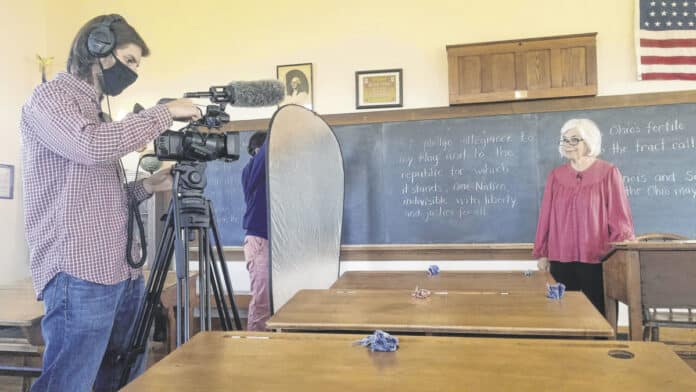
COLUMBUS, Ind. — Organizers of the Columbus Area Bicentennial celebration will agree that 200 years is a long time.
So, too, has been their wait for improving conditions amid the COVID-19 pandemic — one that continues to limit scheduling events of significant size and to delay detailed planning and solidifying event dates of the year-long bash.
They acknowledge that, in the past few weeks, they have been forced into planning to wait and waiting to plan in-person gatherings — including a hoped-for public presentation of a five-part, three-hour, historical Bartholomew County video overview titled “It Began With Bartholomew.” The name echoes the title of former local historian Susanna Jones’ book about the history of the county, named after Lt. Col. Joseph Bartholomew, wounded in 1811 at the Battle of Tippecanoe.
Jones’ daughter, Meg Baker, is among bicentennial planners.
Diane Robbins, executive director of the Bartholomew County Historical Society, is on the bicentennial steering committee and is heading the Legacy Committee.
“We are just kind of taking it week by week and month by month and simply trying to determine when we will be able to hold events,” Robbins said. “But we don’t actually know (yet).”
She estimates that, though the county’s actual bicentennial date is Feb. 15, most of the first few events probably will unfold in late spring or early summer outdoors to better ensure health and safety.
“Until we are able at that time to safely gather, we are kicking off the bicentennial with information on the Facebook page (listed as Columbus Area Bicentennial — Indiana), the website (at columbusarea200.com) and on Instagram,” Robbins said.
As part of that ongoing information, the historical society hopes to post segments of oral history from the late Prentess Smith, a longtime community volunteer who died in 2005 at age 99, days from now to mark Black History Month. In March, the Columbus Area Bicentennial Commission, the historical society and the Bartholomew County Public Library virtually will share other stories and history of women’s impact.
Those stories will cover the suffrage movement, the first female voters, prominent female leaders through the years and more, according to Robbins. Later, there also will be updates on the video funded by the library at a cost of about $11,000. That price includes video shoots, selection of photos from thousands collected and merging those with county historian Tamara Iorio’s script, editing and more.
Iorio has won praise from her bicentennial peers for her extensive effort. Longtime radio broadcaster John Foster is narrator.
Envisionary, a Terre Haute-based marketing and media production house, is handling the effort, and doing final edits now, according to organizers.
“We originally had hoped that it could be done by the end of the year,” said Jason Hatton, library director, and a member of the four-person video planning team. “But these kind of lengthy projects take a lot longer to do than originally anticipated.
“It’s an amazing feat to complete. None of us (locally) ever have done a video. So we know that it just takes time. We had to work on things such as ‘How many pictures do you need for so many minutes of talking?'”
Hatton said special care has been taken to include the areas of the county beyond Columbus, also marking its 200th birthday.
“It’s important those stories are told, and that this isn’t just Columbus-centric,” he said.
Iorio’s forthcoming photo-heavy, hardback, coffee table book also will be broad-based since “we feel obligated to be as inclusive as we can,” as she put it.
“We hope to be able to have some kind of book release party,” said Iorio, who has done a couple of virtual talks referencing the book and video. “But there is still so much that’s up in the air.”
She acknowledged the unknowns have made the planning process frustrating.
“It’s not like we have a choice,” said Iorio, who also is a medical doctor. “We have to put health and safety first. I think we are going to find ways to go with whatever we can do safely — and we’ll make the most of it.”
She, like other organizers, ideally hopes there’s a way to share the movie with groups of people at a time when it’s done.




